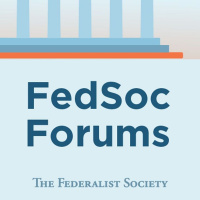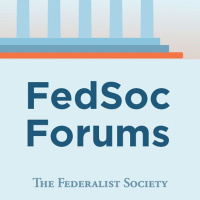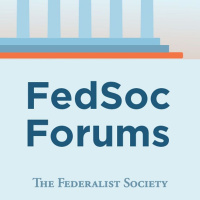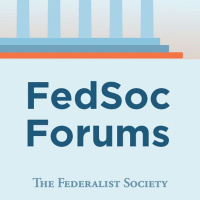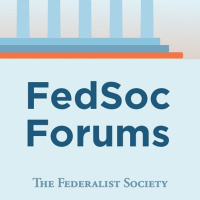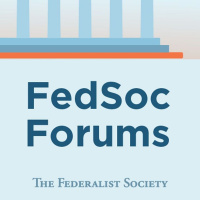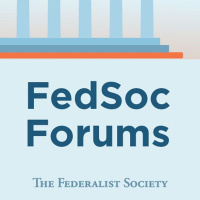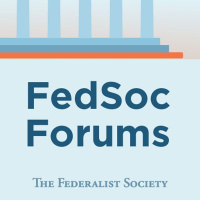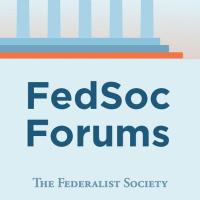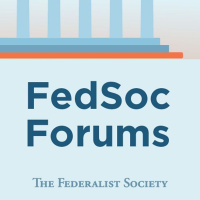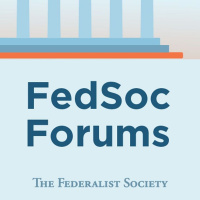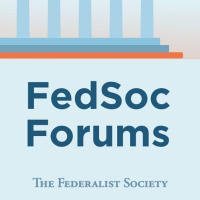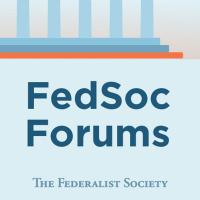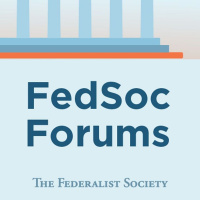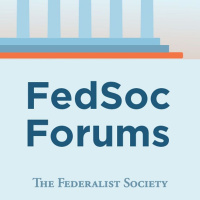Sinopsis
This series of podcasts features experts who analyze the latest developments in the legal and policy world. The podcasts are in the form of monologues, podcast debates or panel discussions and vary in length. The Federalist Society takes no position on particular legal or public policy issues; all expressions of opinion are those of the speakers. We hope these broadcasts, like all of our programming, will serve to stimulate discussion and further exchange regarding important current legal issues.
Episodios
-
Defining Antisemitism: A Debate on Free Speech and Civil Rights
26/08/2025 Duración: 01h14sCongress is currently debating the Antisemitism Awareness Act. This proposed legislation aims to provide a clear definition of antisemitism for use in enforcing existing civil rights laws. Supporters argue that the bill is a crucial tool for combating rising antisemitism by filling a gap in current legal definitions. Opponents, however, contend that the bill could stifle free speech and limit criticism of Israel. Join the Federalist Society for a timely discussion on the legal and constitutional implications of this legislation, exploring the complexities of defining hate speech while upholding the principles of free expression.Featuring: William Creeley, Legal Director, Foundation for Individual Rights and Expression (FIRE)Prof. Eugene Kontorovich, Professor of Law and Director, Center for the Middle East and International Law, George Mason University Antonin Scalia Law SchoolModerator: Aharon Friedman, Special Counsel, Sullivan & Cromwell LLP
-
Legislative or Executive? The Curious Case of the Library of Congress
19/08/2025 Duración: 01h28sThe recent dismissal of the Librarian of Congress and the Register of Copyrights by President Trump raises fundamental questions about the scope of the President’s removal authority and the constitutional status of these offices. Do these officials exercise executive power such that they must be removable at will? Or has Congress validly restricted removal in pursuit of independence?This panel will examine the legal and historical foundations of both positions, tracing the development of the Library of Congress and the Copyright Office, their placement within the legislative branch, and the President’s authority to remove them—if any. The discussion will examine whether these offices lie within the President’s removal authority or whether Congress has validly constrained that power.Our panel will consider the constitutional text, structural implications, and historical practice governing the removal of these unique officers. Featuring:Prof. Anne Joseph O'Connell, Adelbert H. Sweet Prof
-
The Patent Eligibility Reform Act: Clarifying Patent Eligibility for the U.S. Patent System?
19/08/2025 Duración: 01h29sJoin the Federalist Society for a discussion on the Patent Eligibility Restoration Act (PERA), legislation aimed at clarifying and restoring patent eligibility in the United States. Specifically, the bill seeks to restore patent eligibility to inventions that have been deemed ineligible by recent court decisions.The panel brings together top voices in patent law: David Jones, Executive Director at High Tech Alliance; Joseph Matal, Principal at Clear IP; Jamie Simpson, Chief Policy Officer and Counsel at Council for Innovation Promotion; and Former Federal Circuit Judge Kathleen M. O'Malley. The conversation will be moderated by Earl Bright, President and General Counsel at ExploraMED Development.Join this webinar to explore how PERA seeks to reform the framework for determining what types of inventions are eligible for patent protection in the United States. Featuring: David Jones, Executive Director, High Tech Inventors AllianceJoseph Matal, Principal, Clear IP LLCHon. Kathleen M. O'Malley, Former Federal Ci
-
Should a Labor Court Replace the Adjudication Function of the NLRB?
08/08/2025 Duración: 01h24minThe National Labor Relations Board (NLRB) has come under increasing criticism, with some accusing it of constantly reversing precedent, especially in cases involving labor policy issues. Professor Sam Estreicher of the NYU School of Law describes this supposed “policy oscillation” as having created unpredictability for employers, unions, and all stakeholders under the Act as to the state of the law under the NLRA. Many have also brought into question the independence of the NLRB, especially after the recent termination by the President of NLRB Member Gwynne Wilcox. The ensuing litigation regarding her termination will ultimately be decided by the Supreme Court.In hopes of remedying the alleged policy oscillation and partisan interference with the Board’s decision-making, Professor Estreicher, Professor David Sherwyn, and G. Roger King have proposed establishing an Article I labor court to replace the five-member National Labor Relations Board. This panel will discuss the current state of the
-
New Tools in Civil Rights Cases
05/08/2025 Duración: 58minIn recent months, a number of new legal theories and tools have been proposed – some prominently used – in civil rights cases, many involving anti-Semitism in higher education. What legal mechanisms are available against universities, whether in governmental enforcement actions or private party lawsuits? Is Title VI of the Civil Rights Act of 1964 being used in new ways? What about other approaches, such as government contract rules, the Ku Klux Klan Act, RICO, or the use of the tax code and immigration law? The panel will consider a range of possibilities as well as constitutional and statutory limitations.Featuring:Dr. Mark Goldfeder, Esq., CEO and Director, National Jewish Advocacy CenterMarc Greendorfer, Co-Founder and President, Zachor Legal InstituteRobert Shibley, Special Counsel, Campus Advocacy, Foundation for Individual Rights and Expression (FIRE)Marc Stern, Chief Legal Officer, American Jewish Committee(Moderator) Hon. Kenneth L. Marcus, Founder and Chairman, Louis D. Brandeis Center f
-
Labor Law without a Labor Board?
29/07/2025 Duración: 01h02minSince January 2025, the National Labor Relations Board has had only two sitting members—one less than necessary for a quorum. When it lacks a quorum, the Board can’t do things like resolve alleged unfair labor practices or rule on election-related objections. Seeing a policy gap, some states are moving to fill it. California, New York, and Massachusetts are all considering legislation that would transfer at least some of the inactive Board’s duties to state agencies. These bills have sparked a controversy about federal preemption and the role of states in regulating labor relations. Our panelists will flesh out the debates and explain where the debate is likely to go in the coming months.Featuring:Alexander T. MacDonald, Shareholder & Co-Chair of the Workplace Policy Institute, Littler Mendelson P.C.Prof. Benjamin I. Sachs, Kestnbaum Professor of Labor and Industry, Harvard Law School(Moderator) G. Roger King, Senior Labor and Employment Counsel, HR Policy Association
-
Current Issues in Church Autonomy Doctrine: Categorical Immunity, Collateral Order Doctrine, and Neutral Principles of Law
28/07/2025 Duración: 01h14minThe United States Supreme Court first acknowledged what would become the church autonomy doctrine, also known as the ecclesiastical abstention doctrine, in the 1871 case of Watson v. Jones, 80 U.S. 679 (1871). That case involved a schism in a Presbyterian church in Louisville, Kentucky, over the issue of slavery. The Court fashioned a principle that civil courts should not decide issues regarding faith, doctrine, and membership. Later, in Kedroff v. Saint Nicholas Cathedral, 344 U.S. 94 (1952), the Court cemented the rule of deference to ecclesiastical bodies in internal church disputes, grounding the rule in the First Amendment and applying it to states through the Fourteenth Amendment. However, a competing rule emerged in certain circumstances in a 5-4 decision in Jones v. Wolf, 443 U.S. 595 (1979). In Jones, a divided Court held that civil courts may also use “neutral principles” of law to resolve church schisms involving property disputes. Today, courts wrestle with the dilemma of applying def
-
Litigation Update: FTC v. Meta
24/07/2025 Duración: 01h04minThe outcome of FTC v. Meta could reshape the social media landscape as well as U.S. merger policy. For the first time, the government is seeking to unwind two acquisitions more than a decade old, Facebook's purchase of Instagram in 2012 and WhatsApp in 2014. In its complaint, the Federal Trade Commission alleges that Facebook sought to eliminate threats to its social networking monopoly and ultimately harmed consumers through increased user ad loads and decreased quality and user privacy. Meta argues that the social media market is flush with competitors, including X, Snapchat, and TikTok, and that its investments helped both Instagram and WhatsApp expand rapidly. The trial concluded on May 27, 2025 in the U.S. District Court for the District of Columbia, and a decision is expected anytime. Join this FedSoc Forum as we discuss the case and its potential impact.Featuring:Slade Bond, Chair, Public Policy and Legislative Affairs Practice, Cuneo Gilbert & LaDuca, LLPJennifer Huddleston, Senior Fellow, Technol
-
The Case for RESTORE? Injunctions, Patents, and the Future of Innovation
24/07/2025 Duración: 01h09minJoin the Federalist Society for a timely and compelling discussion on the RESTORE Act, legislation aimed at overturning the Supreme Court’s eBay v. MercExchange decision and reinstating the presumptive right to injunctions for patent holders. This panel brings together some of the top voices in intellectual property: former USPTO Director Andrei Iancu, Professors Adam Mossoff and Kristen Osenga, and Chris Storm, IP Legal Director at Uber (speaking in his personal capacity). The conversation will be moderated by Judge Ryan Holte of the U.S. Court of Federal Claims.The webinar will explore how the RESTORE Act seeks to rebalance the patent system in favor of property rights. Whether you're a policymaker, practitioner, or academic, don’t miss this opportunity to hear from leading experts on one of the most consequential patent reform efforts in recent history.Featuring:Hon. Andrei Iancu, Partner, Sullivan & Cromwell LLPProf. Adam Mossoff, Professor of Law, Antonin Scalia Law School, George Mason U
-
A Conversation on the Right: A Potential Solution to Title IX Regulatory Whiplash?
22/07/2025 Duración: 01h47sTitle IX's guarantee against discrimination on the basis of sex in education has been the subject of intensely differing Executive Branch interpretations over the years. These disputes include fundamental disagreements over the meaning of the word "sex" as used in the law, the manner in which the law applies to sex-separated sports and private facilities, the role of Title IX coordinators in responding to sexual harassment, and the due process to which individuals are entitled in campus disciplinary proceedings.Join us for a discussion on the right about how the ever-changing enforcement of Title IX has affected students, families, educators, and institutions and a potential legislative solution to ever-changing interpretations of Title IX.Featuring:Tyler W. Coward, Lead Counsel, Government Affairs, Foundation for Individual Rights and Expression (FIRE)Sarah Parshall Perry, Vice President & Legal Fellow, Defending EducationPaul F. Zimmerman, Senior Counsel, Policy & Regulatory, Defense of Freedom Inst
-
Litigation Update: Medicare Drug Pricing Negotiations
17/07/2025 Duración: 40minJoin the Federalist Society for a webinar on the ongoing legal challenges to the Biden-era Medicare Drug Price Negotiation Program, a component of the Inflation Reduction Act. Ashley Parrish, Partner at King & Spalding, will provide an analysis of the multi-faceted litigation. He will explore how pharmaceutical companies are arguing that the program prevents accountability by granting the government "unlimited, unreviewable, unchecked rulemaking authority" over drug prices, and that it compels speech by forcing participation in agreements that imply voluntary negotiation. Mr. Parrish will also examine recent appellate court rulings and forecast the program's future, including its implications for the broader healthcare landscape. Featuring: Ashley C. Parrish, Partner, King & Spalding, LLP
-
Courthouse Steps Decision: Trump v. CASA, Inc.
17/07/2025 Duración: 57minOn January 20, 2025, President Trump issued an executive order effectively ending birthright citizenship for children born to mothers who are unlawfully present or temporary lawful residents in the United States and whose fathers are not lawful permanent residents at the time of the child’s birth. One day later, four states and three individuals challenged this order in the U.S. District Court for the Western District of Washington, which three days later granted a universal temporary restraining order enjoining the government from implementing this order. Two weeks later, this became a nationwide injunction. Other similar nationwide injunctions have since been issued from the U.S. District Court for the District of Maryland and the U.S. District Court for the District of Massachusetts. The government appealed all of these, and the Supreme Court took the case in order to decide the issue of whether, under the Judiciary Act of 1789, federal courts have equitable authority to issue universal injunctions.
-
FCC Council on National Security
15/07/2025 Duración: 53minEarly in his Chairmanship, Federal Communications Chair Chairman Brendan Carr established a new Council for National Security within the agency. The council aims to "leverage the full range of the Commission’s regulatory, investigatory, and enforcement authorities to protect American and counter foreign adversaries, particularly the threats posed by the People’s Republic of China (PRC) and Chinese Communist Party (CCP)." Join this FedSoc Forum to discuss the council and its implications for the telecommunications and national security spaces.Featuring: Adam Chan, Director, FCC Council on National Security Moderator: Megan L. Brown, Partner, Wiley Rein LLP
-
Should the Federal Government Rely on Competitive Markets to Price Electricity?
15/07/2025 Duración: 01h48sOver the past decade, electricity prices for consumers have risen by more than 22% on average. At the same time, the North American Electric Reliability Corporation (NERC)—the international body responsible for setting reliability and security standards for the North American power grid—has issued increasingly urgent warnings about the growing risks to the U.S. electric power system's reliability.The Federal Energy Regulatory Commission (FERC), an independent agency established by Congress, plays a central role in this space. Under the Federal Power Act, FERC oversees the interstate transmission and wholesale sale of electricity and is responsible for reviewing, approving, and enforcing NERC’s reliability standards.Nearly 30 years ago, FERC fundamentally changed how it regulates the electric power industry. Did those changes contribute to the growing risks to the future reliability of the U.S. electric power system we now face? Or have they helped prevent even greater problems? Most importan
-
Courthouse Steps Decision: Federal Communications Commission v. Consumers’ Research
10/07/2025 Duración: 43minThe Federal Communications Commission (FCC) has traditionally regulated interstate and international communications and, as part of that, maintained a universal service fund that requires telecommunications carriers to contribute quarterly based on their revenues. In order to calculate these contribution amounts, the FCC contracts the help of the Universal Service Administrative Company (USAC). The constitutionality of these delegations of power—to the FCC by Congress and to USAC by the FCC—were challenged in court by Consumers’ Research. On June 27, 2025, the Court ruled in favor of the FCC, rejecting the argument that the universal-service contribution scheme violates the nondelegation doctrine.Join this FedSoc Forum to discuss this case, its decision, and what this means for the nondelegation doctrine going forward.Featuring:Sean Lev, Partner, HWG LLPModerator: Devin Watkins, Attorney, Competitive Enterprise Institute --To register, click the link above.
-
AI Training vs. Copyright Law: Updates from the Copyright Office and the Courts
09/07/2025 Duración: 01h02minWhether AI training and generation is a fair use under copyright law puts two important American business sectors in opposition, and each looks to the various branches of the federal government for answers. Fundamentally, essentially all training of AI models involves copying of copyrighted materials, and many outputs from AI systems also may be substantially similar to copyrighted material and thus infringing if they are not fair uses.On May 9, 2025, the U.S. Copyright Office released a pre-publication version of the third and final part of its report on Copyright and AI, focused on Generative AI Training. The report concludes that some is fair use but some is not, and urges that existing efforts to engage in licensing of copyrighted content continue. Meanwhile, over forty cases on the issue are ongoing in the United States alone, with cases ongoing in another eight nations as well. The District Court in Delaware has ruled that at least one such case was not a fair use, and further rulings are expected s
-
Courthouse Steps Decision: Free Speech Coalition, Inc. v. Paxton
09/07/2025 Duración: 45minFree Speech Coalition, Inc. v. Paxton concerned Texas Law H.B. 1181, and what precedent should apply in considering its impact on free speech. Passed in 2023, the law requires commercial entities, including social media platforms, "that knowingly and intentionally publish or distribute material on an Internet website... more than one-third of which is sexual material harmful to minors" to age-gate their content, and to verify the age of their users, ensuring they are 18 years of age or older.Soon after the law passed, plaintiffs sued, claiming the law violated their right to free speech. Drawing on a line of cases including Ashcroft v. ACLU (2004), they argued that since the law impacted constitutionally protected speech, strict scrutiny should be applied and the TX law failed that test. The Fifth Circuit denied that argument, instead applying a rational basis test, drawing from the precedent of Ginsburg v. New York (1968).The Supreme Court granted certiorari to answer the question of whether the court of app
-
Courthouse Steps Decision: Fuld v. Palestine Liberation Organization
08/07/2025 Duración: 47minIn Fuld v. Palestine Liberation Organization, the Court considered whether the Promoting Security and Justice for Victims of Terrorism Act (PSJVTA) violates the due process clause of the Fifth Amendment. The court heard oral argument on April 1, 2025 and on June 20, 2025 a 9-0 Court ruled the PSJVTA did not violate the Fifth amendment because the statute "reasonably ties the assertion of jurisdiction over the Palestine Liberation Organization and Palestinian Authority to conduct involving the United States and implicating sensitive foreign policy matters within the prerogative of the political branches."Chief Justice Roberts authored the opinion for the Court, and Justice Thomas wrote a concurrence in which Justice Gorsuch joined as to Part II.Join us for a Courthouse Steps decision program where we will break down and analyze this decision and discuss the potential effects of this case.Featuring:Erielle Davidson, Associate, Holtzman Vogel Baran Torchinsky & Josefiak PLLC(Moderator) Shiza Francis, Associa
-
20 Years Later: Kelo v. City of New London
08/07/2025 Duración: 59minIn June of 2005, the U.S. Supreme Court held in Kelo v. City of New London that the local government did not violate the Fifth Amendment's Public Use Clause when it condemned private residential lots and transferred them to commercial developers to promote local economic development as part of a comprehensive municipal development plan. Kelo was certainly a landmark decision and, twenty years later, its impact is still felt and merits further consideration. Join our panel as it discusses Kelo’s legacy, the nature of “public use,” and the judiciary’s current and future relationship with eminent domain.Featuring:Prof. Peter Byrne, John Hampton Baumgartner, Jr. Professor of Real Property Law; Faculty Director, Georgetown Environmental Law and Policy Program; Faculty Director, Georgetown Climate Resource Center, Georgetown Law CenterWesley W. Horton, Of Counsel, McElroy, Deutsch, Mulvaney & Carpenter, LLPTim Sandefur, Vice President for Legal Affairs, Goldwater InstituteProf. Ilya Somi
-
Courthouse Steps Decision: Diamond Alternative Energy LLC v. Environmental Protection Agency
08/07/2025 Duración: 56minIn 2019, the Environmental Protection Agency withdrew California’s previously-granted waiver to implement its Advanced Clean Car Program. This program had been in effect since 2013 and required that car companies reduce carbon dioxide emissions and produce fleets that are at least 15% electric vehicles. The waiver was withdrawn due to a lack of “compelling and extraordinary conditions” and because California could not show a direct connection between greenhouse gas emissions and air pollution.In 2022, however, the EPA reinstated the waiver. This prompted legal challenges from fuel producers (among others) who argued that California did not meet the requirements to justify these state-specific standards. The D.C. Circuit dismissed the fuel producers' statutory claim based on a determination that they did not prove that their injuries would be redressed by a decision in their favor.This Supreme Court case presented the question whether a party may establish the redressability component of Arti

